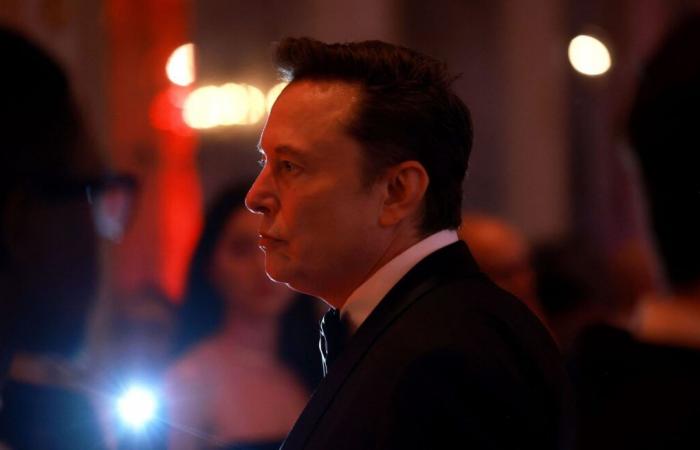After playing a significant role in Donald Trump’s campaign, billionaire Elon Musk, who holds Canadian citizenship, gets involved, from time to time, in Canadian politics. But what influence does he have?
In addition to having invested more than $100 million to mobilize Trump supporters, Elon Musk took advantage of his social network X, which he owns, by organizing a live interview with the former (and future ) president and by distributing partisan publications throughout the presidential campaign.
“Trump/Vance MUST win. I can’t stand seeing and hearing Kamala/Walz for 4 years. That would be cruel and unusual punishment! » he wrote on October 2. His post has been viewed more than 78 million times, liked 709,000 times and shared by 91,000 accounts.
“Elon, on his own network, has a “super user” status, that is to say that everything that is published is viewed more than what the average user would publish,” points out Nadia Seraiocco, doctoral student, speaker and author specializing in issues of cyberculture, datafication and social networks.
Elon Musk doesn’t just care about American politics. He is watching with interest what is happening in Canada too. Two days after Donald Trump’s re-election, the richest man in the world responded to a user’s comment asking for “help getting rid of Trudeau” on X.
“He will be defeated in the next election,” Musk replied, in English. His response has been viewed more than a million times.
Two days later, he shared a graph illustrating the evolution of GDP per capita in Canada, highlighting a decline since the election of Justin Trudeau, whose face was superimposed on the graph.
The next day, Musk published another graph on the decline of the fertility rate in Canada, demonstrating, according to him, that “Canada is dying”.
Nadia Seraiocco believes that “we are entitled to ask if he intends to influence” the next elections in Canada. “This kind of interference in politics is quite particular. And there, we have just seen the impact that it can have,” she worries.
“If Musk had not purchased , believes Aengus Bridgman, director of the Media Ecosystem Observatory at McGill University.
A Canadian interest
Moreover, Elon Musk’s interest in Canadian politics is not new, especially since he himself lived in the country during his youth.
At the age of 17 years old, Elon Musk left South Africa, where he was born and raised, to settle in Canada. He obtained citizenship there thanks to his mother, Maye Musk (maiden name Haldeman), born in Regina, Saskatchewan, in the late 1940s. He began studying economics and physics at Queen’s University in Kingston , in Ontario, for two years, before moving to the United States.
Since reaching the rank of richest man on the planet, the CEO of Tesla has continued to take an interest in Canadian politics, not hesitating to share his criticisms of the first Minister Justin Trudeau in recent years.
“This is not the first time that Elon Musk has alluded to Trudeau as something that annoys him,” underlines Nadia Seraiocco.
In 2022, Musk notably compared the prime minister to Adolf Hitler by publishing a meme illustrating the Nazi leader and where one could read: “Stop comparing me to Justin Trudeau” written above his head and “I had a budget » below.
The latter responded to a publication about the order given by the Trudeau government to banks to freeze the assets of certain organizers of the Freedom Convoy which had paralyzed downtown Ottawa for almost a month
In 2023, Musk also attached the label of “state-funded media” to the CBC network on .
“It’s worrying to see Pierre Poilievre asking him for favors, because, in fact, without Musk’s intervention in the United States, we can wonder if the results would have been the same,” says Nadia Seraiocco.
“And there, is he going to go so far as to intervene in our own policies? One thing is certain, it opens the way for those who want to seek support that is a little unusual,” she continues.
The Conservative Party indicated to Duty that the leader of the opposition, Pierre Poilievre, “is not and has not been in contact” with Elon Musk.
Elon Musk’s interests in meddling in Canadian politics also fit into the broader context of a war against “wokism”, of which Justin Trudeau embodies, for some, the symbol.
The advances in diversity and inclusion that the Prime Minister has promoted since coming to power are seen by the American billionaire as “a danger for society”, explains Aengus Bridgman of the Media Ecosystem Observatory.
Canadian disinformation
In the context of the Canadian elections, Elon Musk could not only take advantage of his influence on X, but also spread disinformation, worries the associate professor at the Media School of the University of Quebec in Montreal (UQAM ) Laurence Grondin-Robillard.
She gives the example of the “election integrity community”, a group created at the end of October by Musk on his platform. The group was supposed to allow users to report potential incidents of electoral fraud, but instead became the place to share conspiracy theories and false information, according to verifications by several American media outlets.
“This is something he could also do in view of the federal elections in Canada, or even in other countries. It’s worrying, because it can really influence our perception if we find out about X, in particular,” argues Laurence Grondin-Robillard.
In response to the election of Donald Trump and the rise of fake news, millions of users chose to leave the X network for the Bluesky platform — the largest exodus of users since Elon Musk purchased the platform , in 2022.
However, the political parties in Ottawa are not planning to follow suit for the moment. A government source told Duty that there are “no plans” for Prime Minister Justin Trudeau and his communications team to leave X.
The Conservative Party simply stated that it “communicates[e] on the platforms used by Canadians.
For Laurence Grondin-Robillard, it remains important for politicians and the media to continue to ensure a presence on X, despite the increasing polarization. “If politicians, researchers and media start leaving the platform, there is a danger of becoming cut off from people [plus à droite] who have an opinion, a right to vote and with whom we must continue to communicate as much as possible. »
With Jean-Louis Bordeleau






